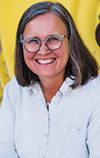The Great Pause continues to amplify cracks in the family dynamic which may lead to separation and divorce. In my coaching practice, this year for the first time, I am navigating transition planning at the same time the founders are leaving their marriage.
I am also receiving calls for help from women who once had a decent farm and ranch life and are now on welfare trying to discover where the assets are hidden. It is not always the woman who is left behind. I’ve also had calls from farm men who are in deep pain when their wives have wiped out bank accounts and taken off.
In these scenarios, I look to Sara McCullough, a self-employed financial analyst with an expertise in divorce. She asks divorcing couples the same questions as her married clients. McCullough has learned to speak to the common interests of the couple, the things they both want. For instance, parents usually understand they will always be co-parenting the children.
McCullough doesn’t ask her clients to prepare for the meeting; she just expects them to show up for the virtual call and dive into responding to her queries. Her response to being prepared is: “Why? I don’t prepare when I take my car to the mechanic.”
As couples separate, they may work with McCullough in separate meetings, and she shares documents freely between the couple. This approach is effective and efficient. She also drives out to farm homes to sit beside the accountant and the farm couple to answer questions in “real time.”
Here are some helpful questions for all of us, married or separated.
- What is the most important to you?
- What are you most worried about?
- Can you trust that we are working for the best outcome for all?
During conversations, McCullough identifies concerns with specific outcomes desired by one individual and reminds both parties that financial division is confusing and scary.
Clients tell McCullough they want to know they are going to be OK tomorrow and the next day – and question if they are doing the right thing.
Grief and loss are real for people on the divorce journey. McCullough says, “Clients often feel a lot of shame around a divorce; sometimes family, friends and advisers use language that increases a person’s sense of shame. It’s time for that to change. You can’t negotiate well or make good decisions when you are feeling ashamed.”
McCullough carved out this financial planning niche when existing clients who decided to divorce refused to separate their financial planning. They had an amicable, not warring relationship. Preserving overall family assets was a goal for both people, and they didn’t see how two planners would achieve that. She helps her clients understand in a broad sense how much is going to be allocated in settlements and encourages her farm clients to save money when they automate their savings automatically out of the sight lines of the farm accounts; even $5,000 a month is possible when it automatically is transferred to the savings account.
She finds men are typically initially afraid of endless child and spousal support, while women tend to be afraid of “not being OK.” In those statements, both men and women are saying they don’t understand how they will each have enough money to cover expenses when they are separate when it didn’t feel like enough when they were together. That’s something that can be worked out, mapped out and understood. Many people don’t really know what is happening with their family living and tend to hide those costs to justify their large outflows of cash. McCullough says the quickest way to figure it out is off of tax statements.
Family secrets and hidden bank accounts do not make a healthy relationship. Keep your financial documents well organized and continue to check in with the current “state of your union.” Financial stress, mental health issues and addictions are bending the resolve of many farm couples. Let’s all commit to a culture of transparency, honesty and grace. It really helps when you cherish your mate and check in often to see how the other is really doing.
Separation is not just about the finances; there are a lot of emotional factors that need healthy input and boundaries as you create a new life on or off the farm. Be open and be clear. Remember, your adult children also are grieving the loss of their parental relationships, and there are many “unknowns” ahead.
There are four farms that touch our farm, and each one has experienced divorce. I care deeply that people can create new chapters for their lives when they need to let go of their spouse.
Divorce on farms is a long journey; expectations of the “new life” will have to be managed. If you have an amicable approach and consider the needs of the farm successors, you will have a much different outcome than the families who are bickering and hiding assets.









